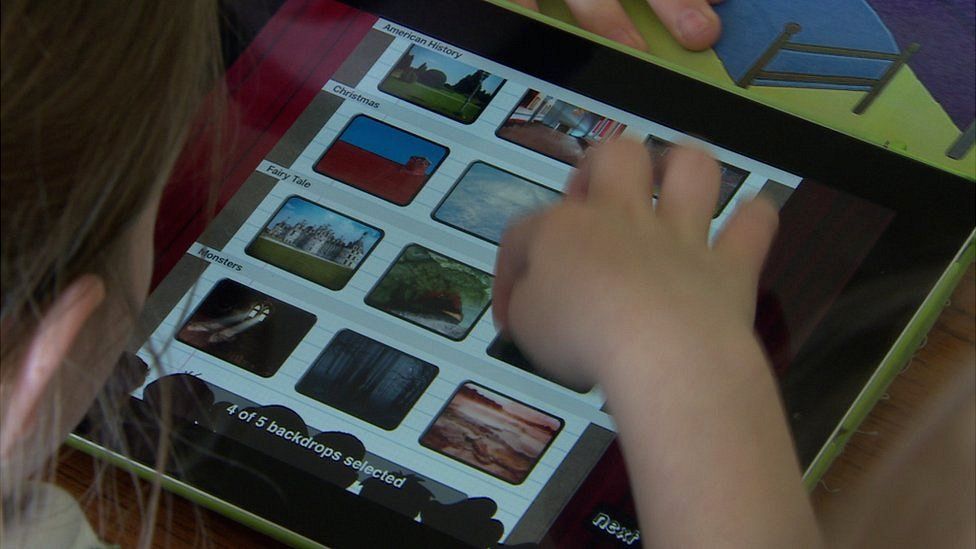IPads 'help improve young pupils' skills'
- Published

Young children's maths, English and communication skills improve if they use iPads in school on a regular basis.
That is one of the key findings of the most in-depth research of its kind ever carried out in Northern Ireland.
The study - Mobile Devices in Early Learning - was carried out over two years and involved about 650 pupils in five Belfast primary schools and five nursery schools.
Schools which took part were in some of the most deprived areas of the city.
They were each supplied with sets of iPads for nursery, primary one, primary two and primary three classes.
Researchers from Stranmillis University College then assessed how pupils, parents, principals and teachers used them over the course of two years.
Among their key findings were that:
- The introduction of digital technology has had a positive impact on the development of children's literacy and numeracy skills
- Contrary to initial expectations, principals and teachers report that the use of ipads in the classroom has enhanced children's communication skills
- Children view learning using handheld devices as play and are more highly motivated, enthused and engaged
- Boys appear to be more enthused when using digital technology, particularly when producing pieces of written work
IPads helped young children to be more motivated and engaged in class, said Dr Colette Gray from Stranmillis, who was one of the study's authors.
"It's not a panacea or the holy grail, but is another method to reach children who might otherwise underachieve," she said.
"For many children it does seem like a playful learning activity. Children, even if working alone, would talk to each others or talk to the teacher.
"There was actually an increase in communication in the classroom, which we didn't initially anticipate."
The five primary schools which received ipads and took part in the study were Black Mountain PS, Donegal Road PS, Gaelscoil na Móna, Holy Trinity PS and Elmgrove PS.
The primary three teacher at Elmgrove PS, Hannah Maxwell, said that using iPads had helped to engage many of her pupils.
"We don't replace pen and paper with the iPad," she said.
"It's all about having a balance between using the iPad and using old school methods.
"They're using different methods and trying different things to learn.
"It does take planning but the benefits are shown at the end of it."
The principal of Elmgrove, Jayne Jeffers, said using iPads had improved many pupils' academic performance.
"We have found that attainment has increased in a lot of areas because the children are more engaged," she said.
"All of the children we have in school now have been born knowing about smartphone technology and mobile technology.
"We have a duty as a school to prepare children for their future and that includes digital learning.
"We have two nursery units and the children are using iPads there right the way up to P7.
"We are situated in inner east Belfast and there would be a lot of deprivation in the local area, but we're trying to give them every advantage we can."
The study also found that although some teachers were initially nervous, many had developed their own confidence by using iPads extensively in class.
There were concerns, however, that parents needed to know more about the safe use of technology if young children were using one outside school.
The total cost of the project, which was funded by Belfast Regeneration Office, was £299,400.